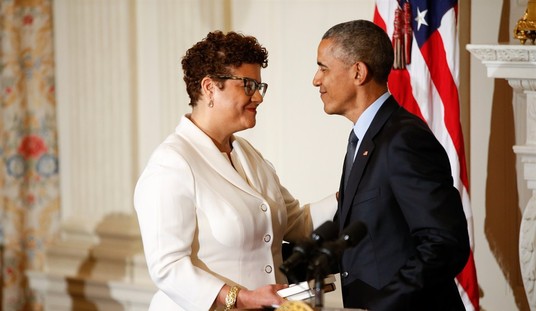The number of Americans could be as high as seven but the State Department hasn’t specified yet. Two workers, one British and one French, are reportedly already dead. Algeria’s a clever choice of targets, not only because France is using the country’s airspace for strikes in Mali but because putting Algerians at risk over French military action is bound to stoke old resentments. Step one in pushing the west out of Mali is turning local opinion against them. Step two is hitting westerners where they live to try to turn opinion at home against intervention too. Taking western workers hostage in an allied north African country does both simultaneously.
According to USA Today, the jihadis are from Mali — which is 600 miles from the BP plant — and negotiations are already under way:
Algerian forces surrounded the kidnappers and were negotiating for the release of the hostages, an Algerian security official based in the region told the Associated Press, adding that the militants had come from Mali. He spoke on condition of anonymity because he was not authorized to speak to the press.
According to the AP, the jihadis might not be from Mali and Algeria has sworn never, ever to negotiate with them:
Algerian forces have surrounded the complex and the state news agency reported a bit more than 20 people were being held, including Americans, Britons, Norwegians, French and Japanese, citing the local authorities.
“Algeria will not respond to terrorist demands and rejects all negotiations,” Interior Minister Daho Ould Kablia said on television. He denied that the militants were from Mali or Libya, possibly suggesting they were from Algeria itself.
There are, allegedly, 41 hostages in all. A spokesman for the jihadi group, which was founded by a former leader of Al Qaeda in the Islamic Maghreb, says they have seven captives at the plant and the rest at the residential complex where plant workers live, which complicates things for special operations planning. The spokesman also claims they’ve planted mines around the refinery to prevent any ground attack. I wonder how long Obama will give the Algerian military to try to resolve this before he decides his “Al Qaeda is on the run” talking point requires American action.
France, incidentally, vowed yesterday to keep troops in Mali until stability is restored; French soldiers were on their way today to Diabaly, the southern Malian town seized earlier this week by jihadis, to engage “direct combat” to try to retake it. Jihadis are countering by spreading out inside the town and embedding with local families to maximize their human-shield protection. (“We are in a classic counterinsurrectionary situation,” said one French military expert.) Why commit to a war as ugly as intractable as that? Because, say the French, it can’t wait any longer:
Marc Trévidic—France’s leading investigating magistrate on Islamist terrorism tells TIME that northern Mali and the wider Sahel had become such a vivid arena of jihadi recruitment, combat, terror training, and control that it’s threat to African and European security was too great to ignore any longer. Allowing it to develop further, Trévidic argues, would have been tantamount to letting a pre-9/11 Afghanistan flourish in a place just a few hours away from Europe by plane. “We know individuals left France for Mali in order to join Islamists in the north for training, and know people had been tasked with creating recruitment networks for that jihad,” says Trévidic, whose new book, Terrorists: The Seven Pillars of Madness, examines various aspects of radical development—and surveillance of budding extremists. “That flow has increased over the months, and it’s clear that stream will eventually reverse itself as trained terror operatives head back for France and Europe. It has to be cut.”
They’re expecting attempted terror attacks in France too, of course, possibly by African jihadis traveling to Europe or possibly by jihadis who are already in France and willing to act at the behest of African jihadi groups. Meanwhile, the negotiations in Algeria continue. Stand by for updates.
Update: Reuters explains the economic significance of the target and how the west’s last intervention inadvertently helped place it in jeopardy:
The attack could have implications for security across the whole of Algeria’s energy sector, which supplies about a quarter of Europe’s natural gas imports and exports millions of barrels of crude oil each year.
Such an attack would require a large and heavily armed insurgent force with a degree of freedom to move around, all elements that al Qaeda has not previously had.
However, the conflict in neighboring Libya in 2011 changed the balance of force. Security experts say al Qaeda was able to obtain arms, including heavy weapons, from the looted arsenals of former leader Muammar Gaddafi.
Update: With America’s last attempt to build a counterterror force inside Mali having failed utterly, will Obama respond to requests for a second try?
The besieged government in Mali asked the United States last week for military help to repel al-Qaeda-linked militants, a senior U.S. official said Wednesday. The disclosure appeared to contradict earlier U.S. characterizations that only France had been asked to intervene.
“The Malian government made a specific request of the United States, as they did the French, several days ago for assistance in combatting the threat posed by the rebels,” in the country’s north, the State Department official said.
Minor problem: Because the Malian military — which was trained by U.S. forces — overthrew the democratically elected government last year, the U.S. is now barred by law from intervening directly to help. Bear that in mind for when the inevitable stories start appearing at the Times or the Washington Post next month about how Obama is using drones and secret Special Ops to assist them after all. If he can ignore the War Powers Act in Libya, why can’t he ignore this?








Join the conversation as a VIP Member